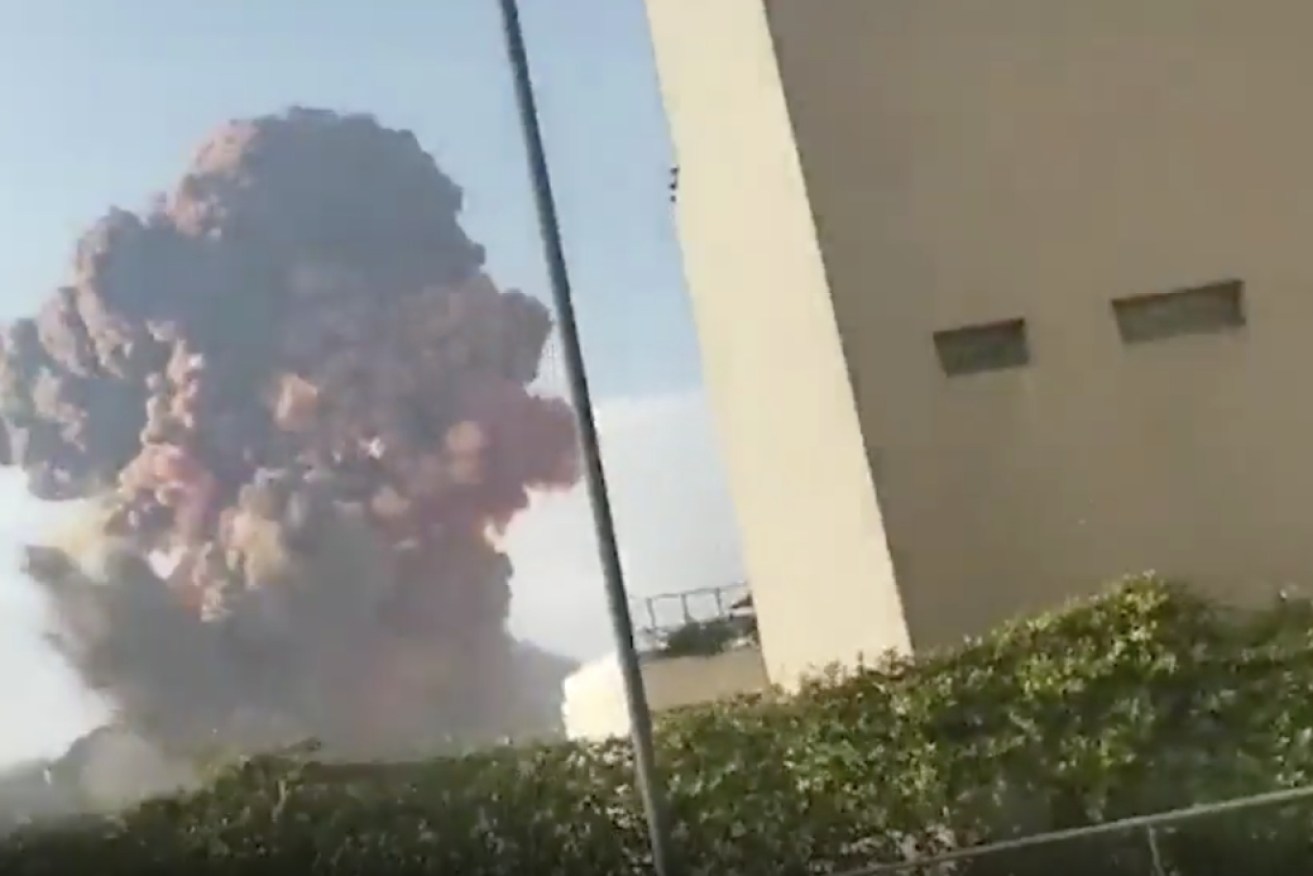Australian among dead after massive blast rocks Beirut
UPDATED | An Australian has died and the Australian embassy in Beirut has been “significantly impacted” after a huge explosion in port warehouses in the Lebanese capital killed at least 100 people, injured thousands more and destroyed or damaged an undetermined number of buildings.

Photo supplied
The governor of Beirut port told Sky News a team of firefighters, who were battling the initial blaze, had “disappeared” after the explosion.
Footage of the explosion shared by residents on social media showed a column of smoke rising from the port followed by an enormous blast, sending up a white cloud and a fireball into the sky.
Those filming the incident from high buildings two kilometres from the port were thrown backwards by the shock.
My brother sent me this, we live 10 KM away from the explosion site and the glass of our bldgs got shattered. #Lebanon pic.twitter.com/MPByBc673m
— Abir Ghattas (@AbirGhattas) August 4, 2020
It was the most powerful explosion in years to hit Beirut, which is already reeling from economic crisis and a surge in coronavirus infections.
President Michel Aoun said that 2750 tonnes of ammonium nitrate, used in fertilisers and bombs, had been stored for six years at the port without safety measures, and he said that was “unacceptable”.
He called for an emergency cabinet meeting on Wednesday.
Israel, which has fought several wars with Lebanon, has denied any role and offered help.
“What we are witnessing is a huge catastrophe,” the head of Lebanon’s Red Cross George Kettani told broadcaster Mayadeen.
“There are victims and casualties everywhere.”
Prime Minister Scott Morrison said the Australian embassy had been damaged but staff had escaped without major injuries. However, it had been confirmed that one Australian died, although the location was not revealed.
“It’s my deep regret to inform you that one Australian has been killed in this horrific blast,” Morrison told the Nine Network.
He said there were usually about 20,000 Australians in the Lebanese capital but he was unsure how many had returned to Australia because of the coronavirus pandemic.
“Our hearts really go out to our Lebanese Australian community,” he said.
“I know there will be many prayers in the churches and the mosques in Australia but given the COVID restrictions, I would just urge the appropriate response.”
Foreign Minister Marise Payne said the embassy had considerable damage from the blast.
“About 95 per cent of the windows and front of the chancery of the embassy have been blown out,” she told ABC radio.
“Staff have been affected by a number of glass injuries. Fortunately, they are relatively minor and they have all been treated.”
Hours after the blast, which erupted shortly after 6 pm local time, a fire still blazed in the port district, casting an orange glow across the night sky as helicopters hovered and ambulance sirens sounded across the capital.
A security source said victims were taken for treatment outside the city because Beirut hospitals were packed with wounded.
Ambulances from the north and south of the country and the Bekaa valley to the east were called in to help.
The blast was so big some residents in the city, where memories of heavy shelling during the 1975 to 1990 civil war live on, thought an earthquake had struck.
Dazed, weeping and wounded people walked through streets searching for relatives.
“I promise you that this catastrophe will not pass without accountability,” Prime Minister Hassan Diab told the nation.
“Those responsible will pay the price,” he said in his televised address, adding that details about the “dangerous warehouse” would be made public.
The interior minister told Al Jadeed TV that ammonium nitrate had been stored at the port since 2014.
President Michel Aoun called for an emergency cabinet meeting on Wednesday and said a two-week state of emergency should be declared.
He said it was “unacceptable” that 2750 tonnes of ammonium nitrate were stored for six years without safety measures.
The prime minister called for a day of mourning.
The death toll has reached 100 and more victims are under the rubble, the head of the Lebanese Red Cross has told local broadcasters.
George Kettaneh told LBCI TV by telephone that the Red Cross was coordinating with the health ministry for morgues to take victims because hospitals were overwhelmed after Tuesday’s blast.
-with AAP
Want to comment?
Send us an email, making it clear which story you’re commenting on and including your full name (required for publication) and phone number (only for verification purposes). Please put “Reader views” in the subject.
We’ll publish the best comments in a regular “Reader Views” post. Your comments can be brief, or we can accept up to 350 words, or thereabouts.




